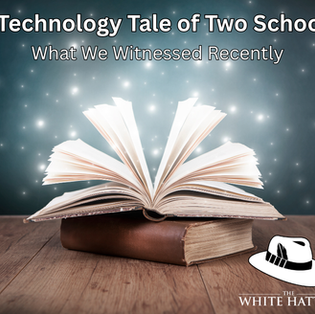Social Media, Kids, Parents, and Accountability vs. Responsibility
- The White Hatter

- Sep 7, 2025
- 4 min read

A national study conducted by MediaSmarts in 2022 found that 86% of Canadian youth aged 9 - 11 have an account on at least one social media platform, even where the official age minimum is 13 or older. (1) In the United States, a 2025 large-scale study of over 10,000 U.S. early adolescents (under 13) found that 63.8% reported using social media. (2) Recent reports from Australia found that those between the ages of 8-12, 36% had their own social media account, 77% said their parent or caregiver helped set it up, and 54% accessed social media through a parent or caregiver account. (3) In Ireland, 71% of 8 -12 year olds had accounts on platforms that clearly set a minimum age of 13. (4)
What do all these countries and studies have in common, despite rules, large numbers of children under 13 are using social media platforms, often with direct parental knowledge and involvement. The findings don’t just raise questions about the accountability of tech companies, they also shine a light on something closer to home, parental responsibility.
It’s true that social media platforms are not currently being held legally accountability when it comes to protecting youth. Age gating is often no more than typing in a false birthdate, and companies have long known how easy they are to defeat, and parental controls on their platforms are often easily by-passed. Stronger safeguards are needed such as:
Privacy respecting age assurance technologies.
Greater corporate accountability for enforcing their own policies that is demanded through legislation. and
Transparent reporting about how many underage accounts are removed and why enforcement fails.
The current system for holding internet sites and social media platforms accountable is clearly inadequate, and families deserve more. This is why we support legislation that requires a safety by design approach to protect young people using these platforms, which carry significant financial consequences for failing to comply with legislation.
However, focusing only on the companies ignores a critical factor. Platforms cannot put a phone, tablet, or laptop in a youth or teen’s hands. That decision lies almost entirely with parents and caregivers.
As mentioned above, research shows that many adults not only know their child is on social media before age 13, but some actively help their child set up the accounts. Some parents and caregivers do this to prevent their child from feeling left out, others to “monitor” use more closely. While these motivations are understandable, they carry significant consequences, especially when it comes to online exploitation and access to material that is not age and developmentally appropriate.
When parents bypass rules, they don’t just expose children to platforms designed for older users, they also teach that rules around technology don’t matter and that it is okay to lie about things, like your age, when they are online. As parents and caregivers do we really want to model that type of behaviour?
Beyond privacy, child development research highlights that kids under 13 are still building the impulse control and critical thinking needed to handle social pressures, advertising, and online conflict. Platforms may be fun and social, but they are also engineered around algorithms, persuasive design, and peer dynamics that can “sometimes” overwhelm “some” younger users.
Some argue that parents and caregivers simply don’t understand the seriousness of these risks. In reality, the past decade has been filled with media coverage, public service announcements, and school presentations on youth and online safety concerns, so this ignorance argument doesn’t hold a lot of weight. It seems less about ignorance and more about competing pressures, such as the belief that “my child is different,” the fear of exclusion, and the difficulty of setting boundaries when “everyone else is online.”
Acknowledging those pressures doesn’t excuse them, but it does explain why so many parents feel conflicted.
So what is a reasonable path for moving forward?
Even if platforms introduced foolproof age verification backed by strong, enforceable legislation, the safety, security and privacy issues would still remain if parents allow children under 13, or 16 in some countries, to access these spaces. This is why accountability and responsibility must go hand in hand.
Social media companies need to develop stronger, privacy-respecting safeguards. (legislated accountability), and
Parents and caregivers must set boundaries, model responsible use, and sometimes say “not yet”, even when it’s difficult. (parental responsibility)
This article is not about judgment or parent shaming/blaming, but about recognizing where the power really lies, and that is with us parents and caregivers. If you provide the device, the Wi-Fi, the data plan, and the approval, then responsibility starts with you, the parent or caregiver the minute you hand that device, or access to the internet, over to your child.
Your child doesn’t need you to be their best friend when it comes to technology. They need you to be their sheepdog, mentor, their guide, and yes, sometimes the gatekeeper. Saying no isn’t always easy, but setting boundaries and following the terms of service of these platforms is one of the most important part of parenting in today’s onlife world.
The lesson from Canada, the United States, Australia and Ireland is clear; social media use for those under 13 is not just a corporate accountability issue, it is a parenting responsibility issue. Until platforms significantly strengthen their safeguards, parents will remain the first and most critical line of defence, and we believe that will always be the case, regardless of what legislation is introduced no matter where you live.
Be your child’s best parent and not their best friend when it comes to technology, the internet, and social media, there is a difference!
Digital Food for Thought
The White Hatter
Facts Not Fear, Facts Not Emotions, Enlighten Not Frighten, Know Tech Not No Tech
References:














